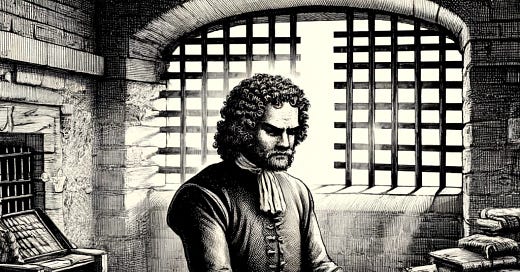James Glen: The Imprisoned Bookseller
In the bustling streets of 17th-century Edinburgh, a humble bookseller named James Glen found himself at the heart of a political and religious storm. His story, emblematic of the era's volatile political climate, serves as a powerful reminder of the dangers faced by those who dared to challenge the status quo.
The 17th century was a period of significant upheaval in Scotland, marked by religious conflicts and political power struggles. The country was deeply divided between supporters of the Presbyterian Church of Scotland and those who adhered to Roman Catholicism or Anglicanism. This division was further exacerbated by the broader context of the English Civil War and the subsequent rule of Oliver Cromwell, which brought about a temporary but significant change in the balance of power within the British Isles.
During this period, the Scottish government was heavily influenced by the Covenanters, a faction committed to maintaining Presbyterianism as the national religion. However, the restoration of Charles II to the throne in 1660 heralded a backlash against the Covenanters and a resurgence of efforts to enforce episcopal governance and suppress dissenting religious views.
James Glen and His Controversial Publication
James Glen, a bookseller in Edinburgh, found himself caught in the crossfire of these religious and political tensions. In 1687, he published a pamphlet titled "The Root of Romish Ceremonies," which criticized Roman Catholic practices and accused them of being a revival of pagan rituals. This publication came at a time when the Catholic King James VII of Scotland (also James II of England) was attempting to promote religious tolerance towards Catholics and Anglicans, which was met with fierce resistance from the predominantly Presbyterian Scottish populace.
Glen's pamphlet quickly attracted the attention of Lord Chancellor James Drummond, Earl of Perth, a staunch supporter of King James VII and his policies. The Chancellor, seeking to maintain control and suppress any anti-Catholic sentiment, saw Glen's publication as a direct challenge to the king's authority and religious policy.
Imprisonment and Trial
Acting on the orders of the Lord Chancellor, authorities arrested James Glen and brought him before the Privy Council. The charge was serious: Glen was accused of inciting religious hatred and undermining the king's efforts to promote religious tolerance. The political climate of the time was unforgiving to those perceived as agitators, and Glen's trial was swift.
During the trial, it became evident that Glen's boldness had not only stemmed from religious conviction but also from a sharp wit. When the Privy Council issued an edict against the sale of books critical of Catholicism, a royal macer delivered this decree to Glen. His response was as witty as it was daring: he remarked that "there was a book in his shop which condemned Popery very directly—namely the Bible; might he sell that?"
This statement, while highlighting the perceived contradiction in the edict, only served to further irritate the authorities. His boldness and refusal to back down from his principles exemplified the spirit of resistance prevalent among many Scots of the time.
Glen was found guilty and sentenced to imprisonment. His time in jail was marked by harsh conditions, but he remained resolute, earning the respect and admiration of many who saw him as a martyr for the cause of religious freedom and resistance against tyranny.
Legacy and Reflection
James Glen's imprisonment is a poignant chapter in the history of religious and political strife in 17th-century Scotland. His case illustrates the broader struggle between the ruling authorities and those who fought to maintain their religious convictions in the face of persecution. Glen's story is not just about a man who published a controversial pamphlet; it is about the enduring spirit of resistance and the fight for religious and intellectual freedom.
Today, James Glen is remembered as a courageous figure who stood up against the oppressive measures of his time. His life and the consequences he faced highlight the importance of freedom of expression and the vital role it plays in a healthy, functioning society.
As we reflect on James Glen's story, we are reminded of the ongoing need to defend these freedoms against any form of oppression. The tale of the imprisoned bookseller from Edinburgh continues to inspire and challenge us to consider the costs and responsibilities that come with standing up for one's beliefs, even in the face of overwhelming adversity.





